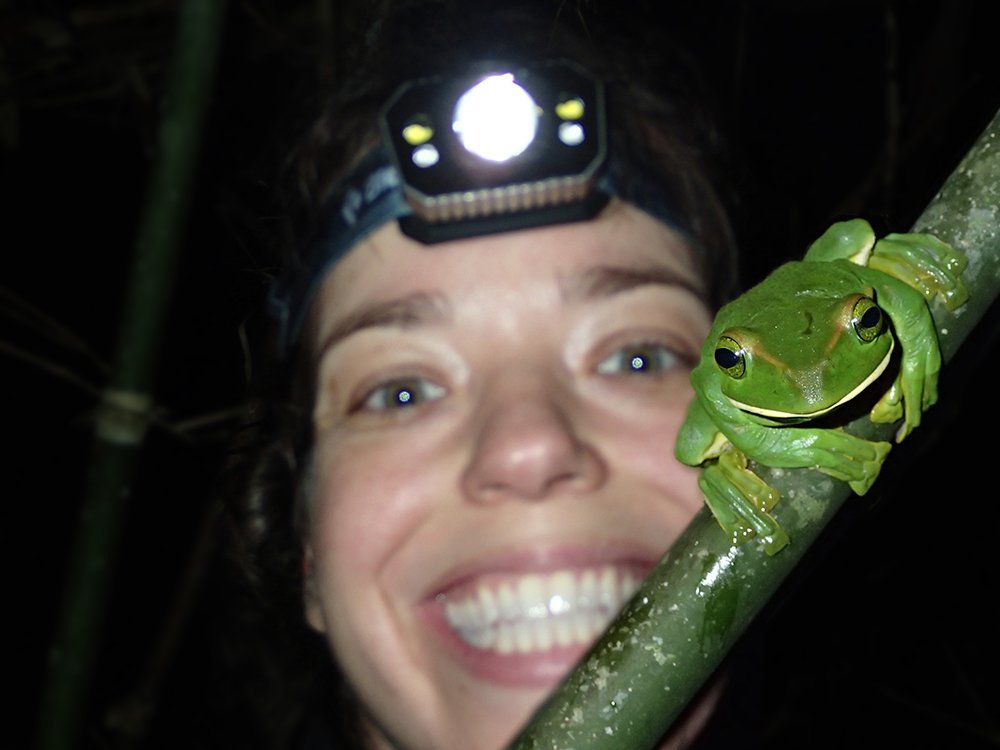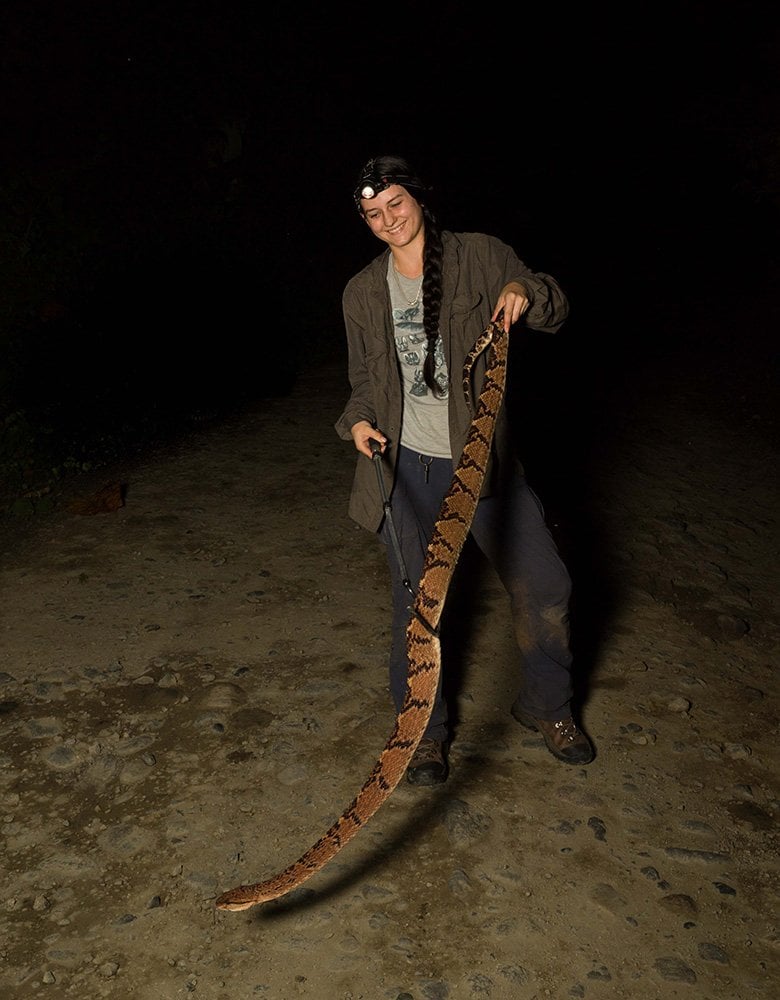How three women were inspired to enter the male-dominated field of herpetology

BACK IN February Kirsten Hecht, a PhD student from the University of Florida began the #HERpers movement on Twitter, encouraging women who study reptiles and amphibians to make themselves and their work visible.
Despite being a male-dominated area of science, women shared their stories and pictures of their muddy encounters with some of the most dangerous creatures in existence to prove women could be ‘herpers’ as well.
And while the #HERpers movement resonated with women working in herpetology around the world, for the women working in the field here in Australia, where the image of the Aussie outback larrikin wrestling crocodiles and wrangling snakes reigns supreme, the movement was ground-breaking.
Here, we spoke to three inspiring women working with Australia’s unique reptiles and amphibians about their experiences with sexism and how to can get more girls into herpetology
Jodi Rowley, Frog biologist

(Image Credit: Australian Museum)
SINCE LAUNCHING the FrogID app, which records a frog’s unique croak, Jodi Rowley has arguably become Australia’s best-known frog biologist. However, it wasn’t until university that she encountered her first amphibian.
What motivated her into her environment science degree, rather than frogs, was her love for the outdoors.
“I used to have a horse and I’d ride through the trails along the edges of Kuringai-Chase National Park and that’s where I connected to nature, which made me think a lot about the environment and animals.”
Jodi hasn’t followed the traditional academic path that many of her peers have followed.
“Even though I got my PhD, I worked for a conservation organisation and now work for the Australian Museum, a job I didn’t even realise existed.”
The extensive, international fieldwork required for her job at the Museum has given her unique insights into sexism in the industry.
“I’ve been told very disappointedly by people, ‘Oh, I thought you were a man,’ because I guess Jodi isn’t a super common name in certain areas of the world.
“I might be naïve sometimes about sexism in the field because I’m just so passionate I don’t even realise, and it’s only been in recent years that I’ve thought, ‘Oh, wait maybe that could have been because I was a woman.’.”
Jodi is at the forefront of encouraging girls into the field, which she believes comes down to role models.
“Outreach and scientific communication in TV series, documentaries, textbooks, or anything that is spruiking herpetology needs to have strong female leads.
“I love talking to young girls and telling them that jobs like being a frog biologist actually exist. When I was young, I had absolutely no idea that being a frog biologist is a thing that you can do.”
Bindi Irwin, Conservationist and herper

(Image Credit: Ben Beaden/Australia Zoo)
COMMITTED TO the wildlife mission pioneered by her parents Steve and Terri Irwin, Bindi has spent most of her life working with reptiles.
“I could never understand why society had so many preconceived notions about reptiles, thinking that they are terrifying creatures.”
An inspiration to young girls around the world, she’s never been intimidated or discouraged to work with reptiles — an attitude she attributes to positive role models.
“My Mum and Dad are absolutely my greatest teachers. They have always encouraged me to follow my dreams and that means the world to me.
“Wes Mannion, the Director of Australia Zoo and my dad’s best friend, has also always been a wonderful teacher…I can remember being little and we would practice the scientific names of my favourite snakes.”
Because her dad Steve assumed that everyone was an equal part of the team and having seen so many women studying herpetology at the Zoo, Bindi has never seen herpetology through a masculine lens.
“I think that there can be cases of herpetology being perceived as a masculine field but growing up I’ve known so many extraordinary women changing the way people view this field.
“At the Australia Zoo Wildlife Hospital, Dr. Amber Gillett has been studying sea snakes for years and continues to work tirelessly to educate others about these fascinating animals.
“Melissa Bruton studied woma pythons as a University of Queensland PhD student for many years to uncover the mysteries of this species.
“We have so many amazing women working here at Australia Zoo that are extremely passionate about herpetology. It warms my heart to see such dedication.”
Jasmine Vink, Ecologist, herper and photographer

HAVING REGULARLY spent time with family up in Cairns, Jasmine was surrounded by plump, green tree frogs— in the toilet and the shower—from a very young age. But it was an early encounter with a common tree-snake that sparked her interest in herpetology.
“My dad allowed us to gently hold the small, harmless snake before we safely released it back into our garden. I was captivated by reptiles after this, and they still continue to amaze me.”
Jasmine says, while her classes at high school weren’t necessarily focused on herpetology, that her high school was surrounded by bushland with large eucalyptus trees, which inspired her to enter an ecology-based science degree.
“I would have loved to have had more environmental education at school as I think it is really important. I am happy to see some primary and high schools now actively encouraging students to get connected with nature.”
After working in the field of ecology and herpetology for a number of years, Jasmine has encountered sexism, which she says is still alive and well in the male-dominated field of herpetology.
“On one trip I had someone tell me bluntly that they do not like working in the field with women because they are too ‘girly’ and become scared easily.”
For Jasmine, ending sexism in the field comes down to visibility.
“Providing younger women with positive and contactable role models is vitally important to foster the ‘that could be me’ attitude.
“Herpetology is a diverse field. It can be anything from milking highly venomous snakes to having a purely lab- based position working on genetics and taxonomy. There is a role for all females, from the field- savvy to those more comfortable in a research lab.”
READ MORE:




